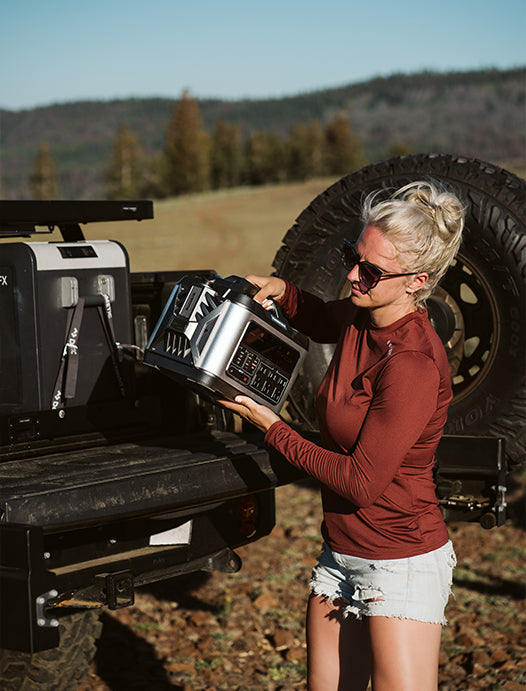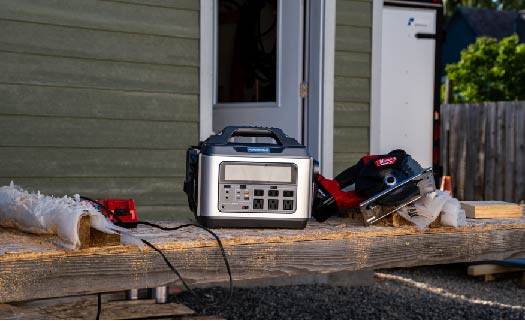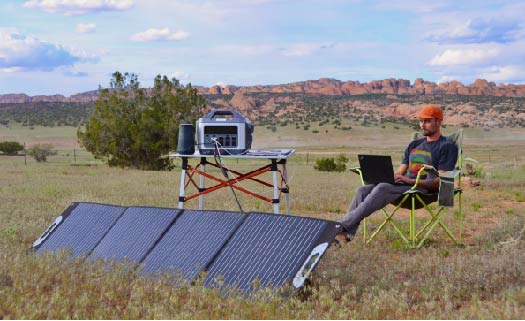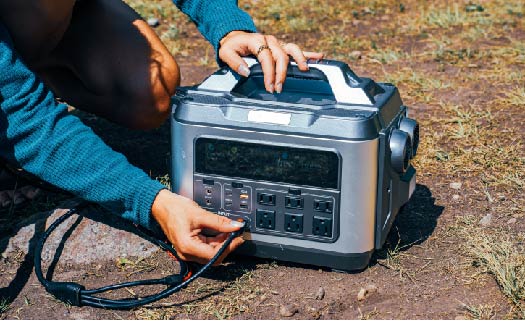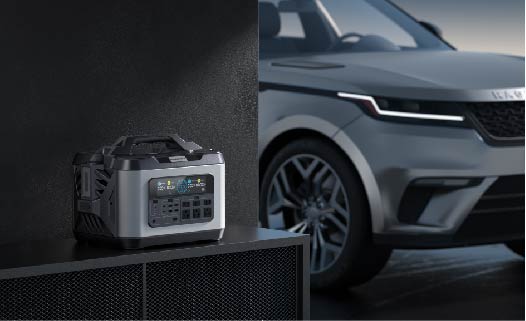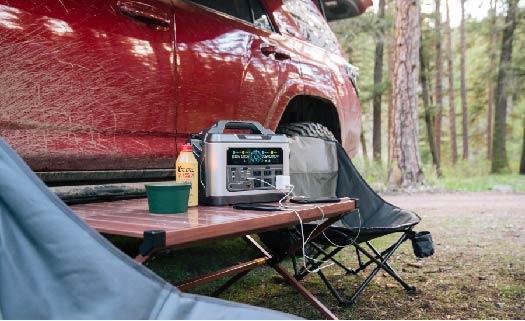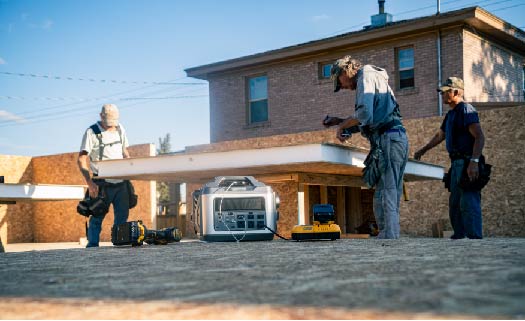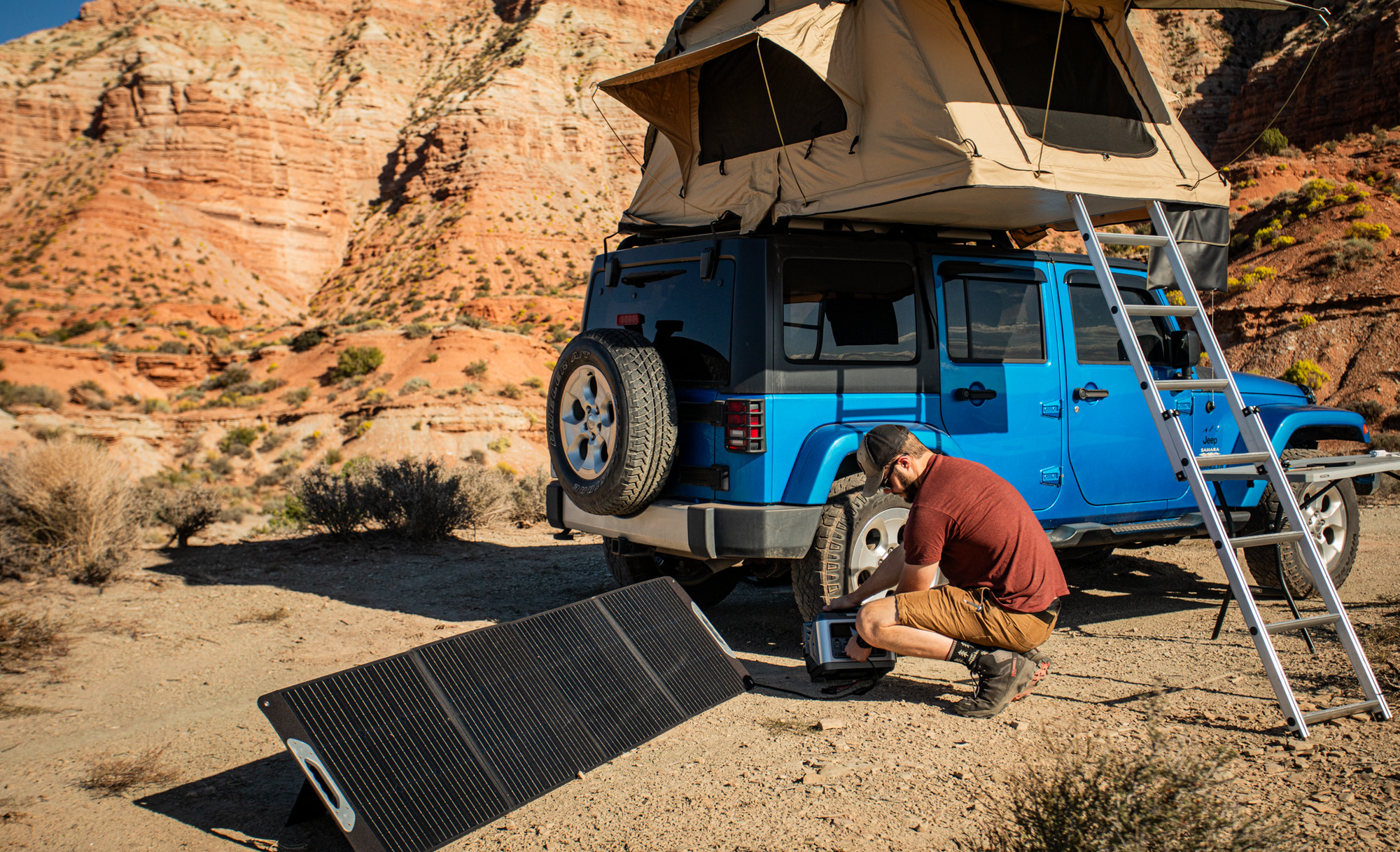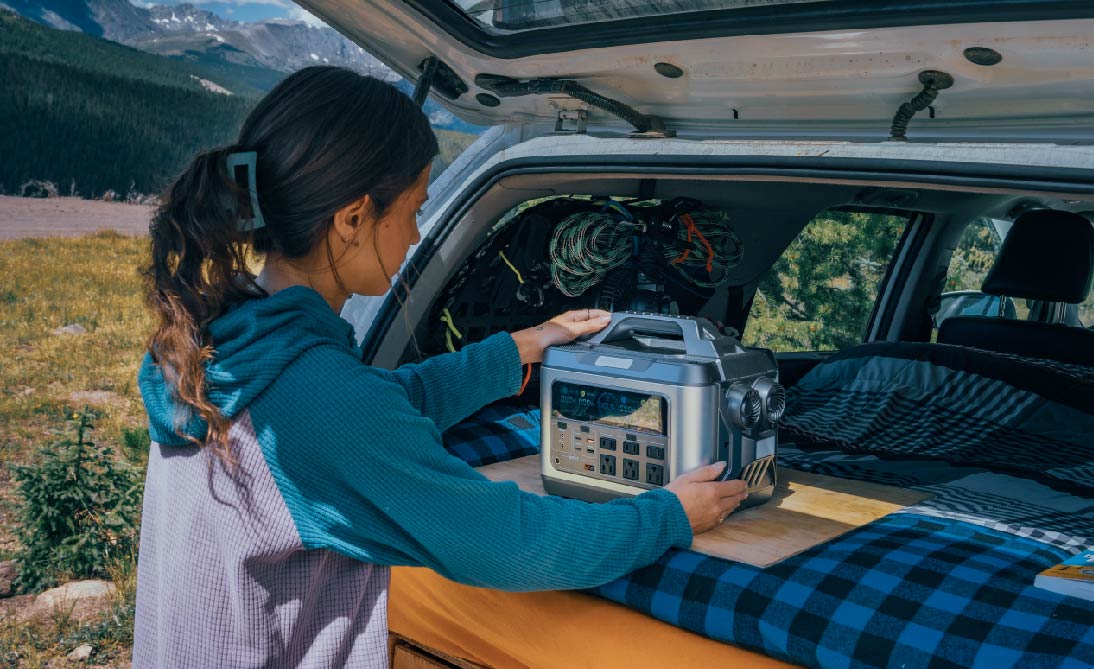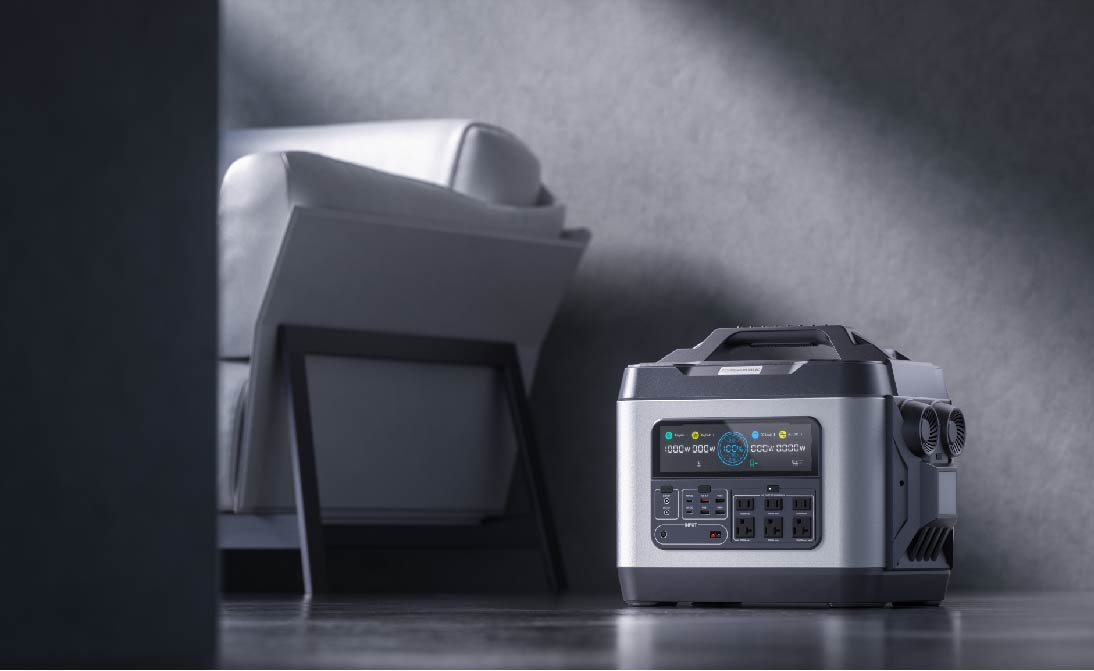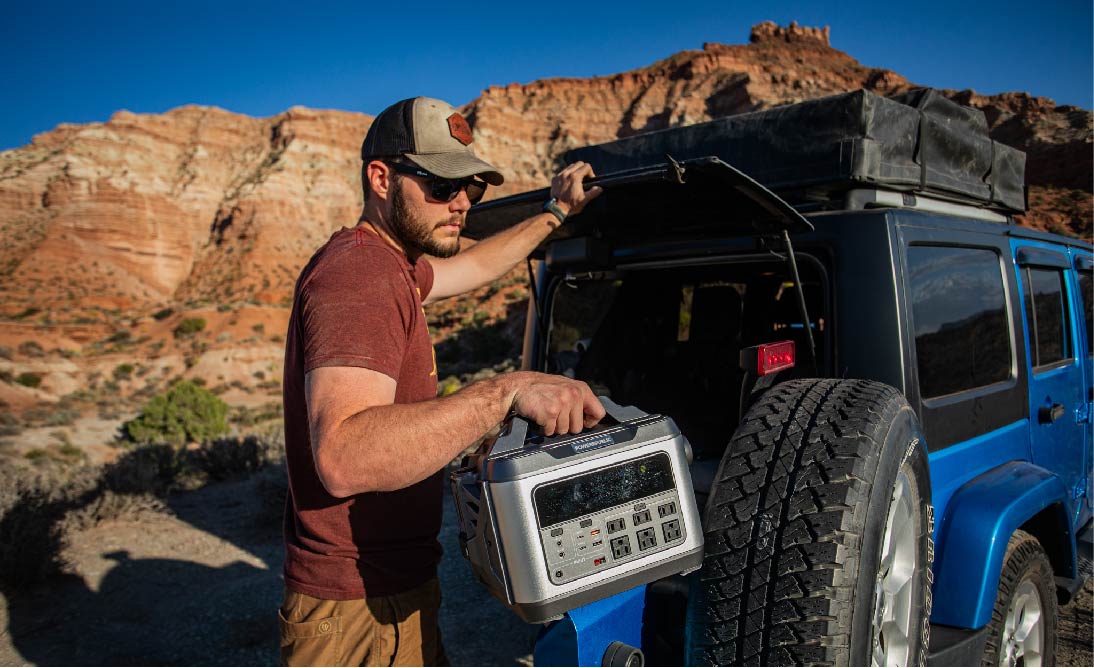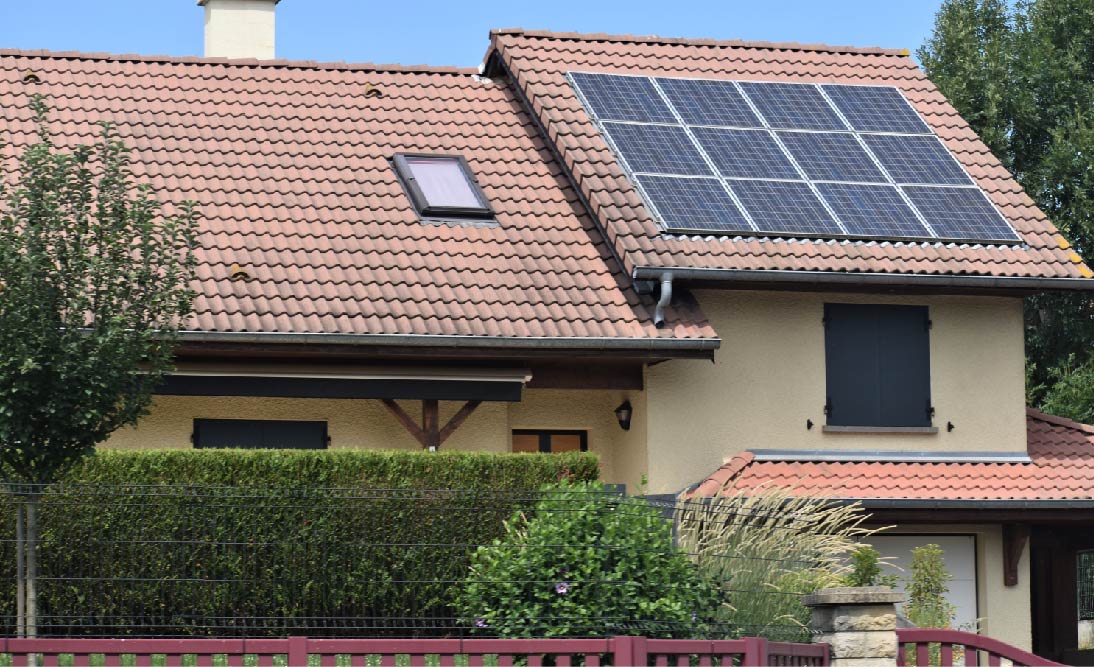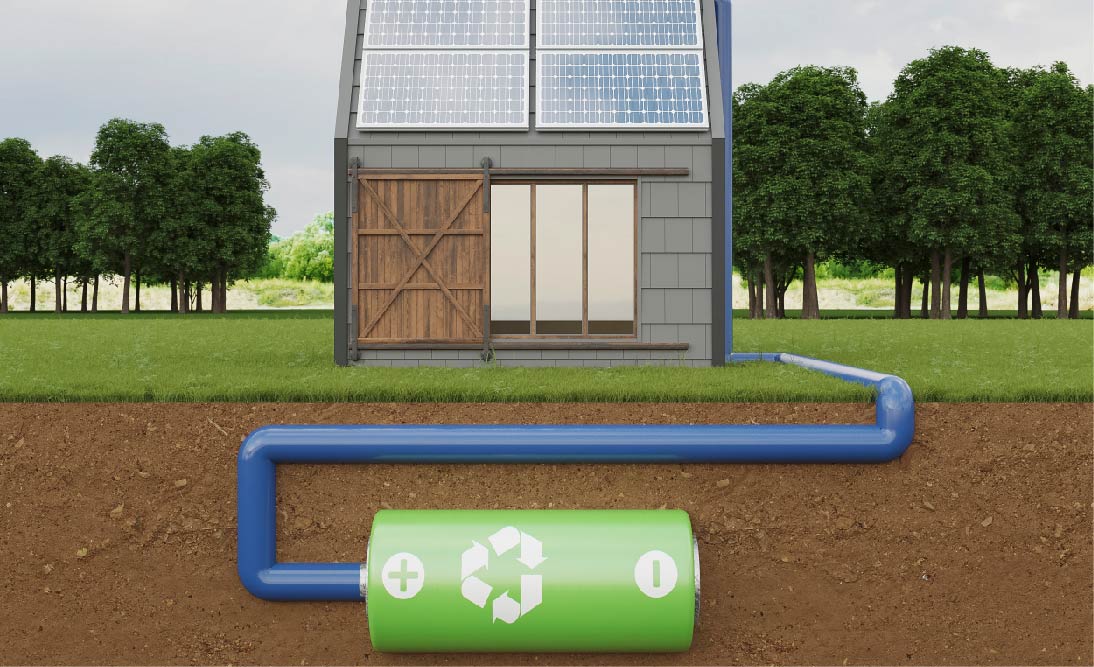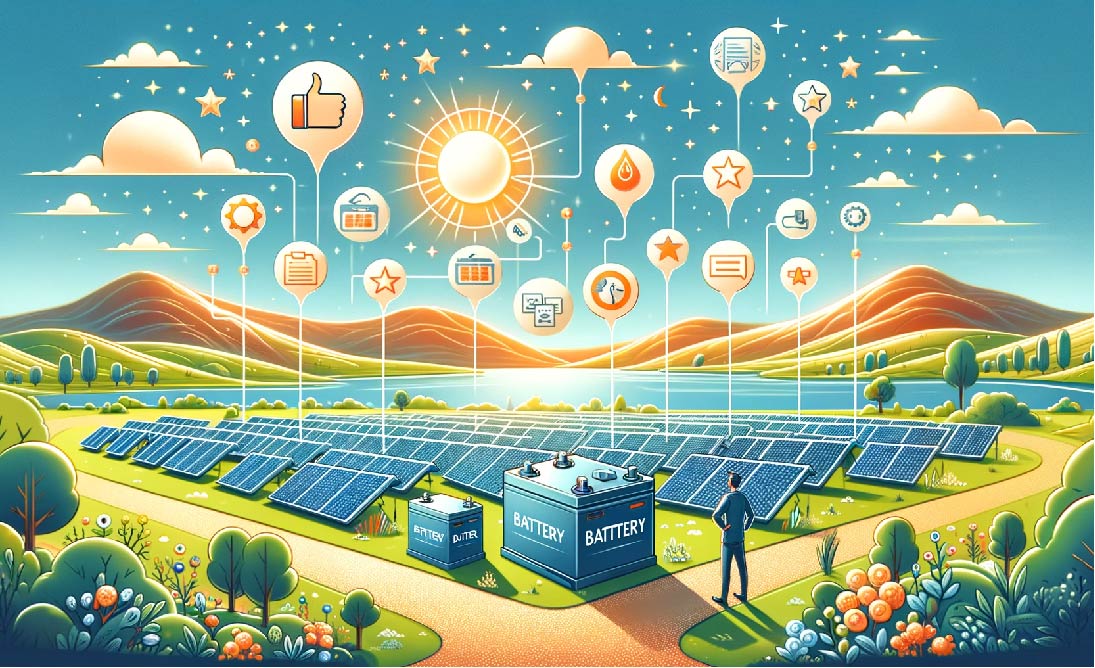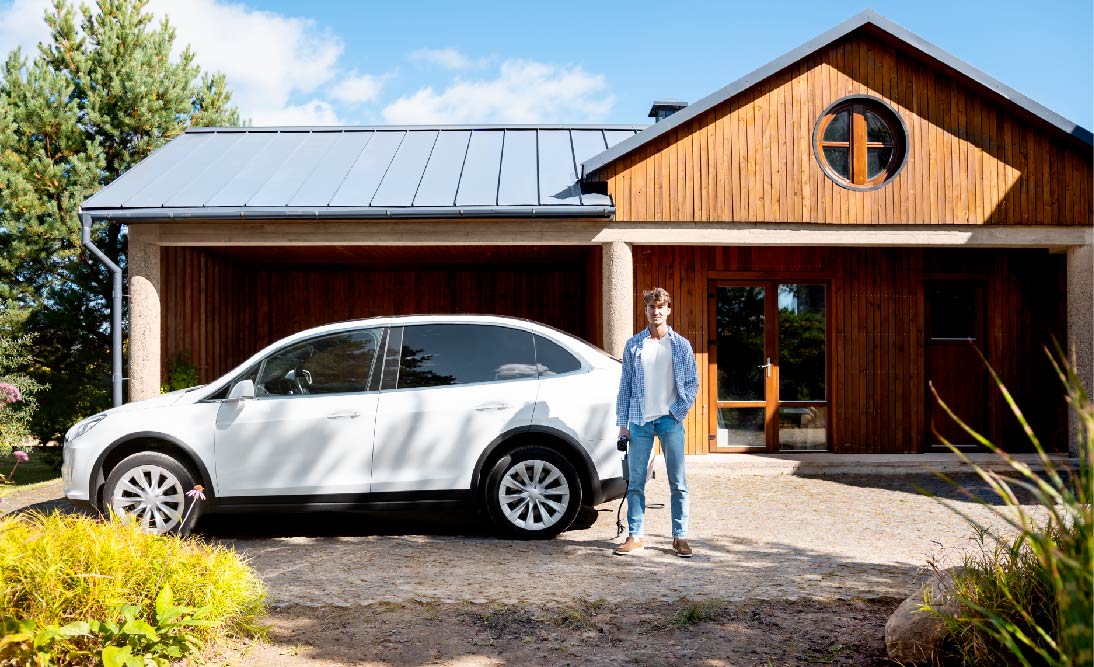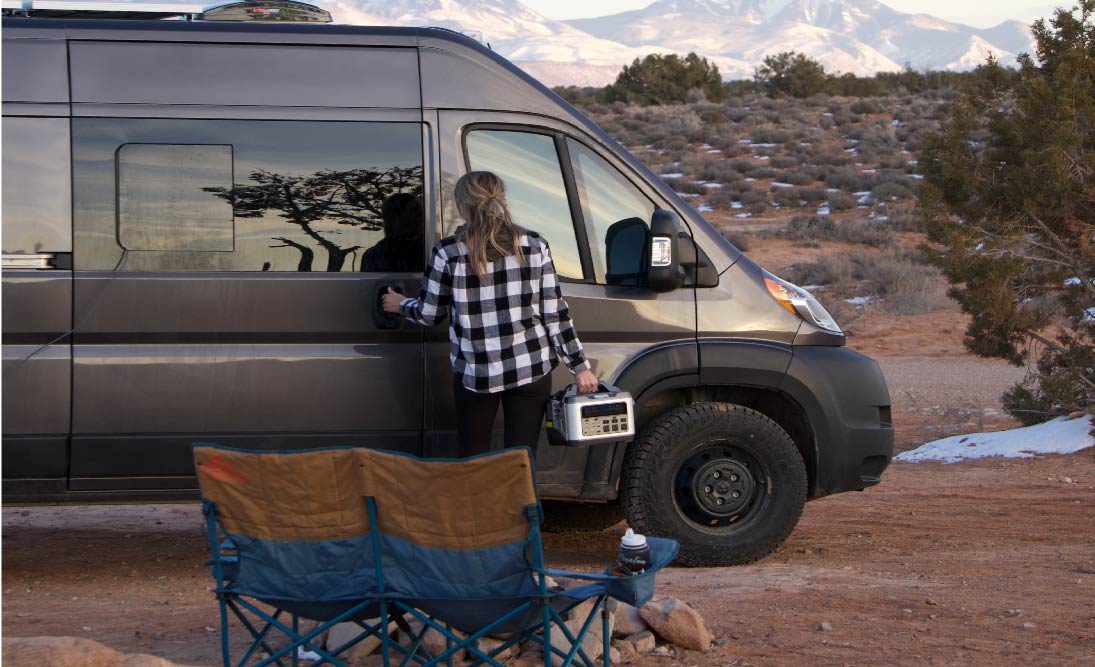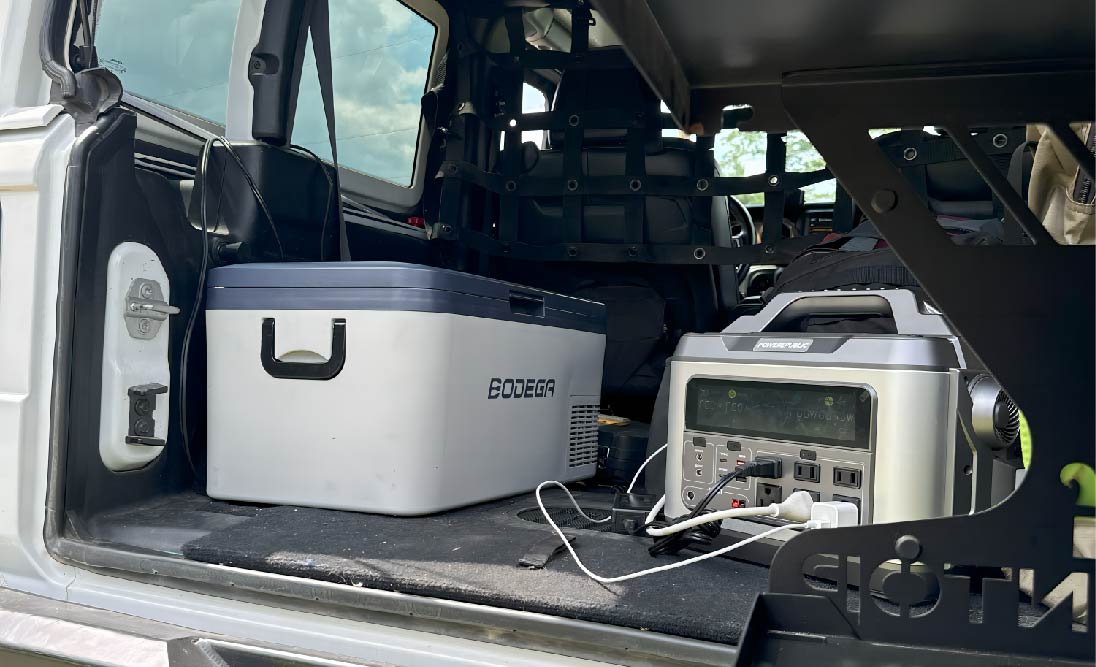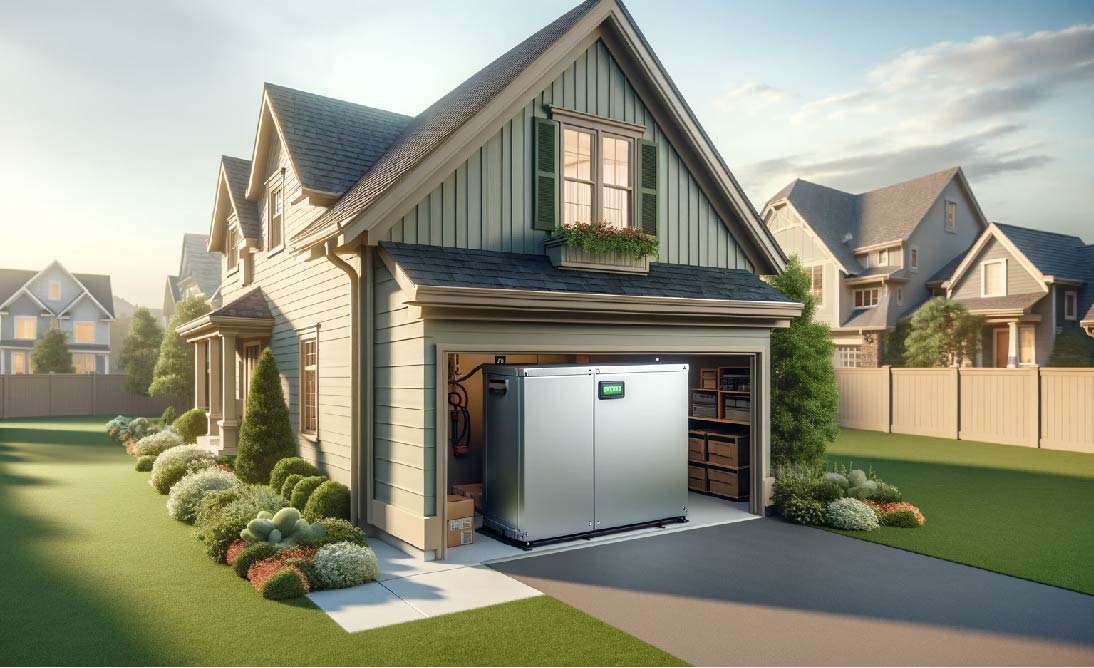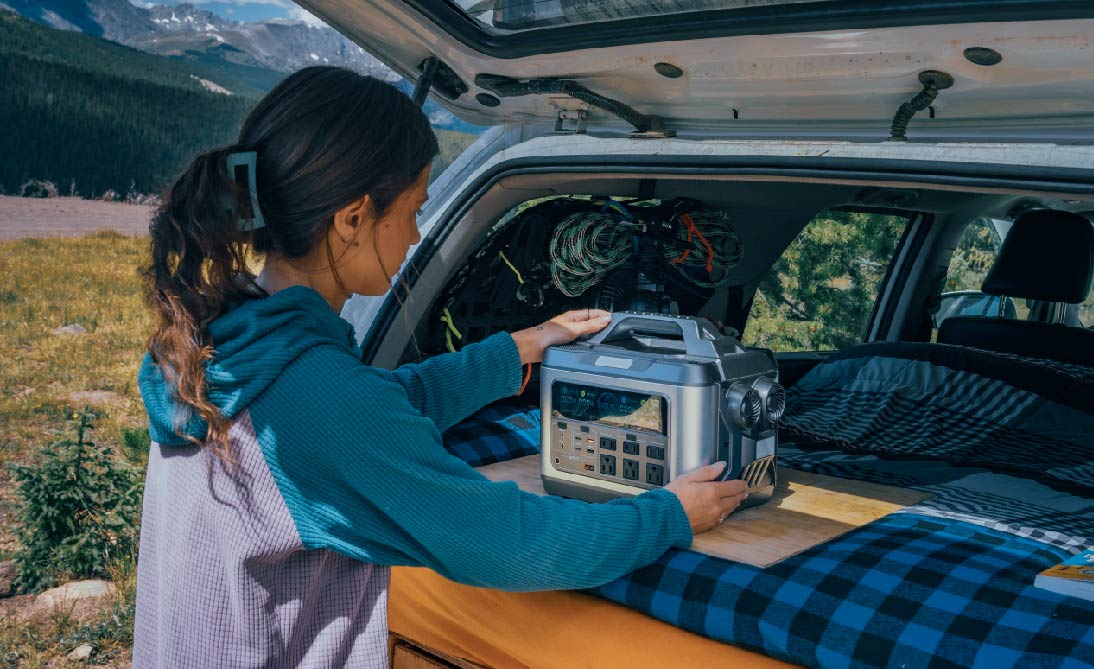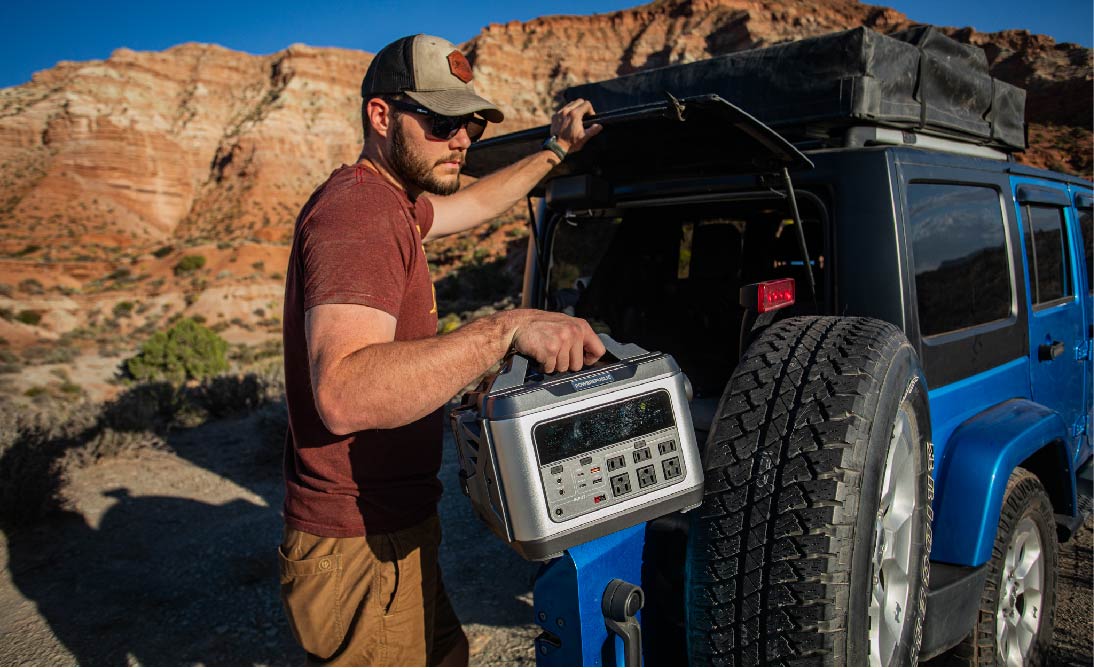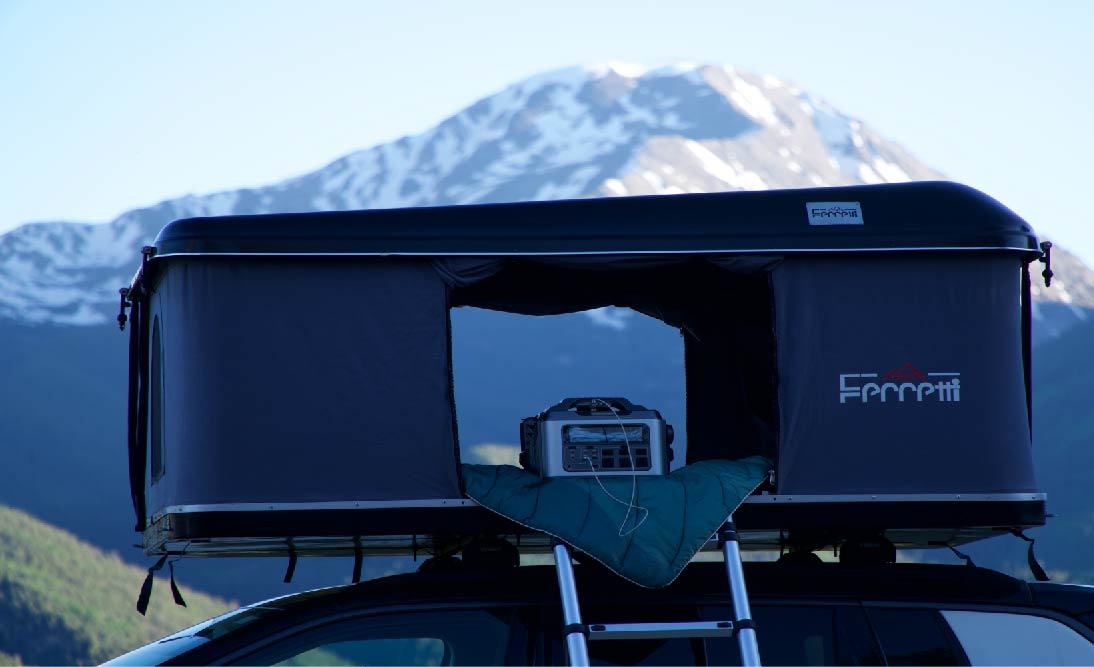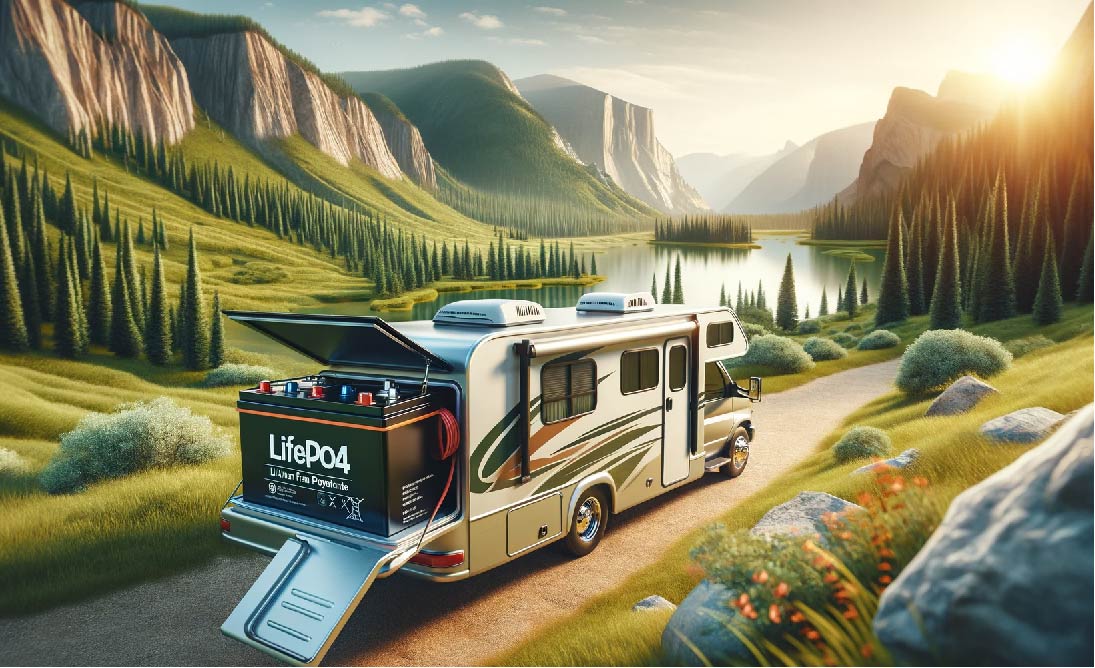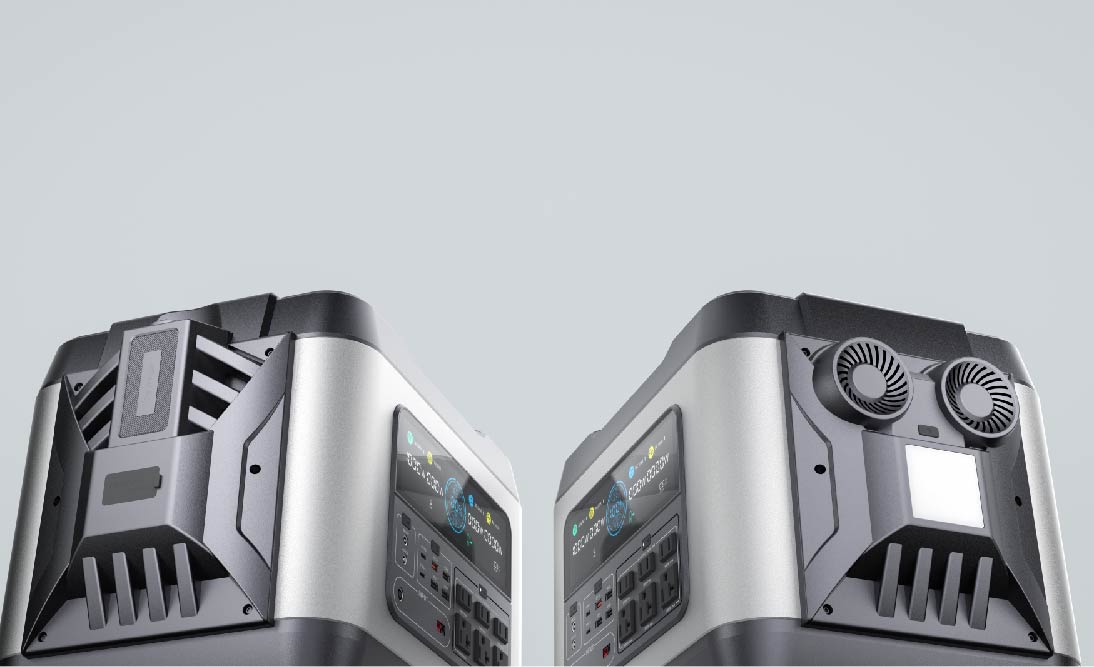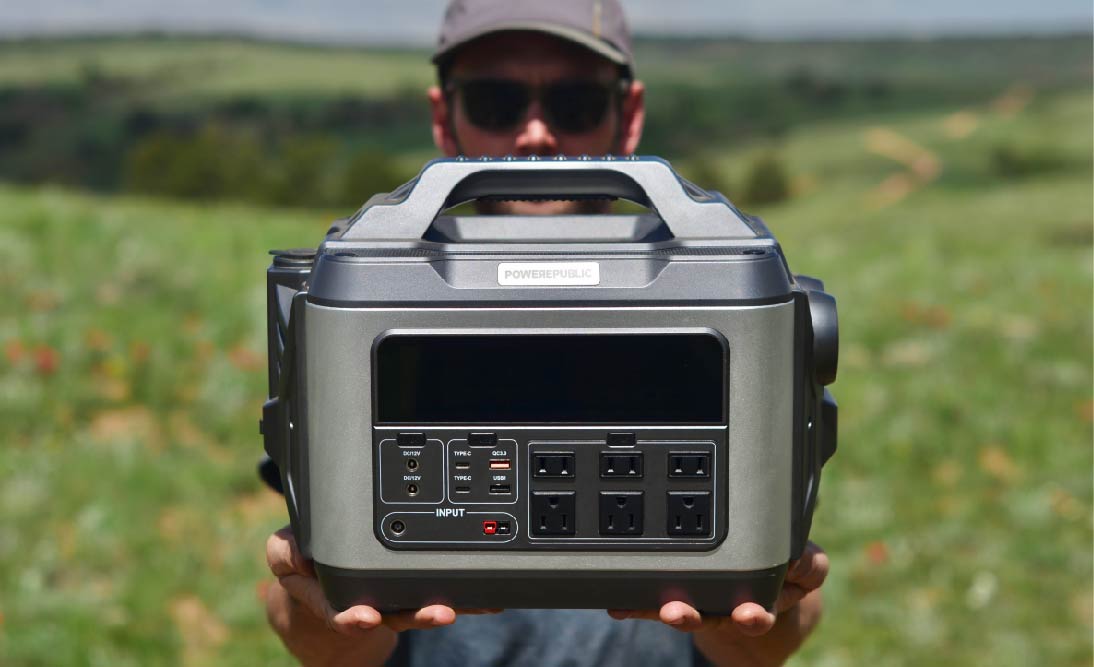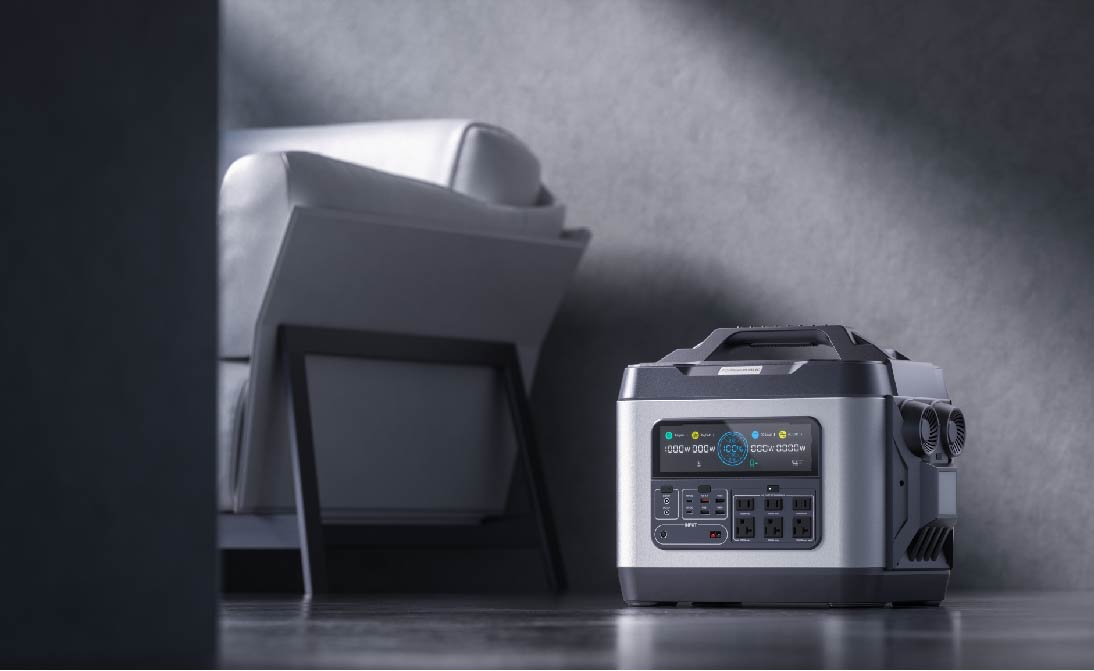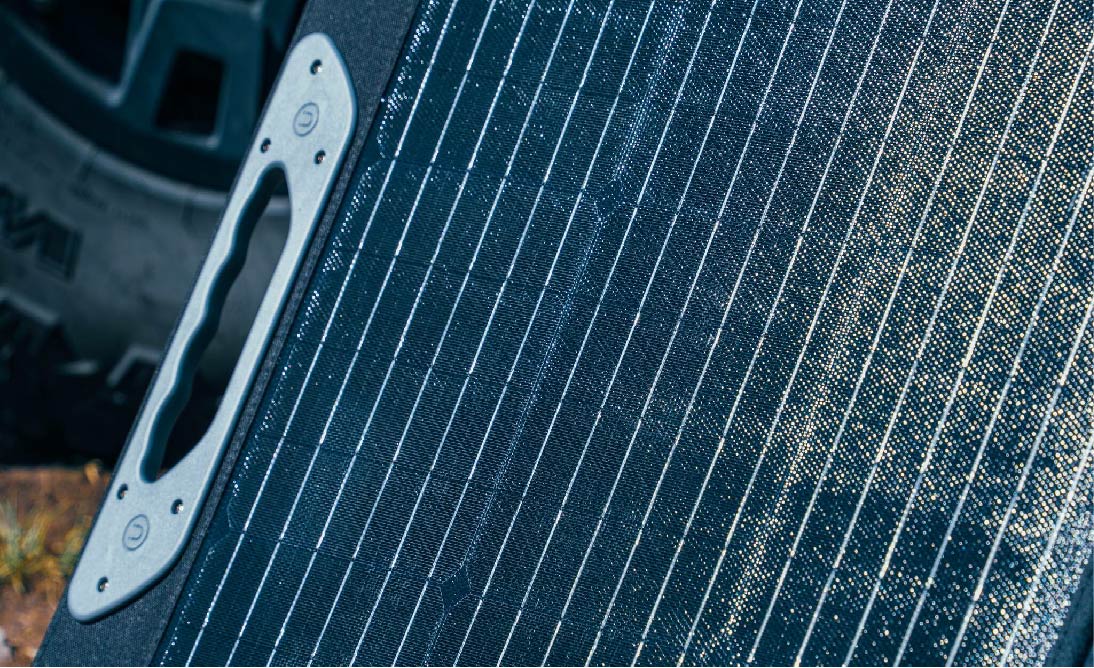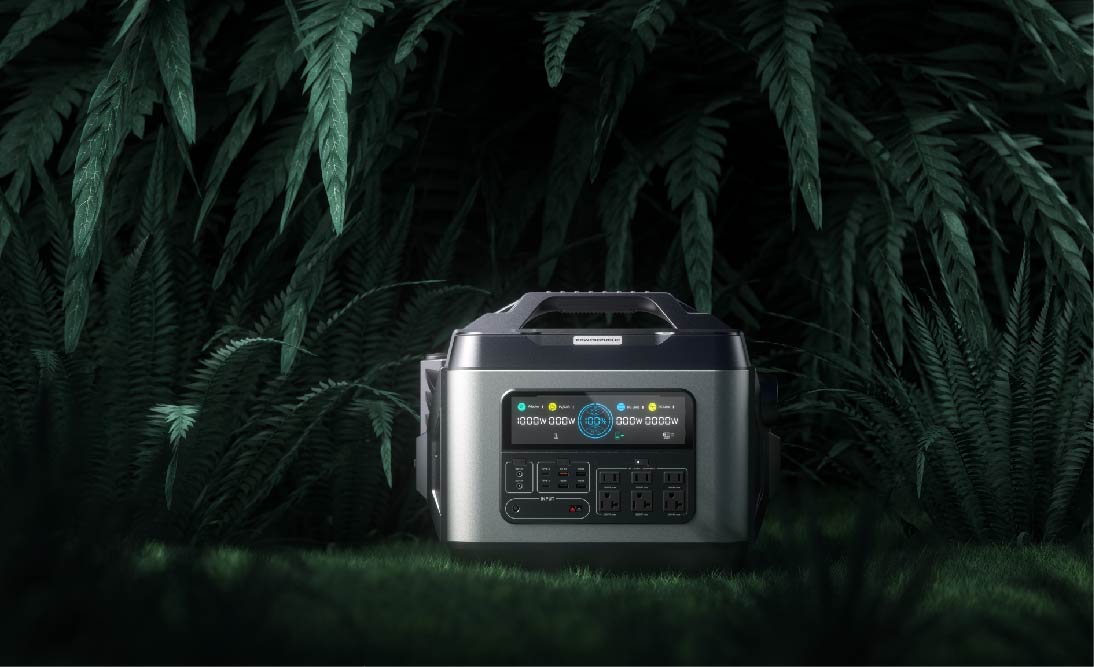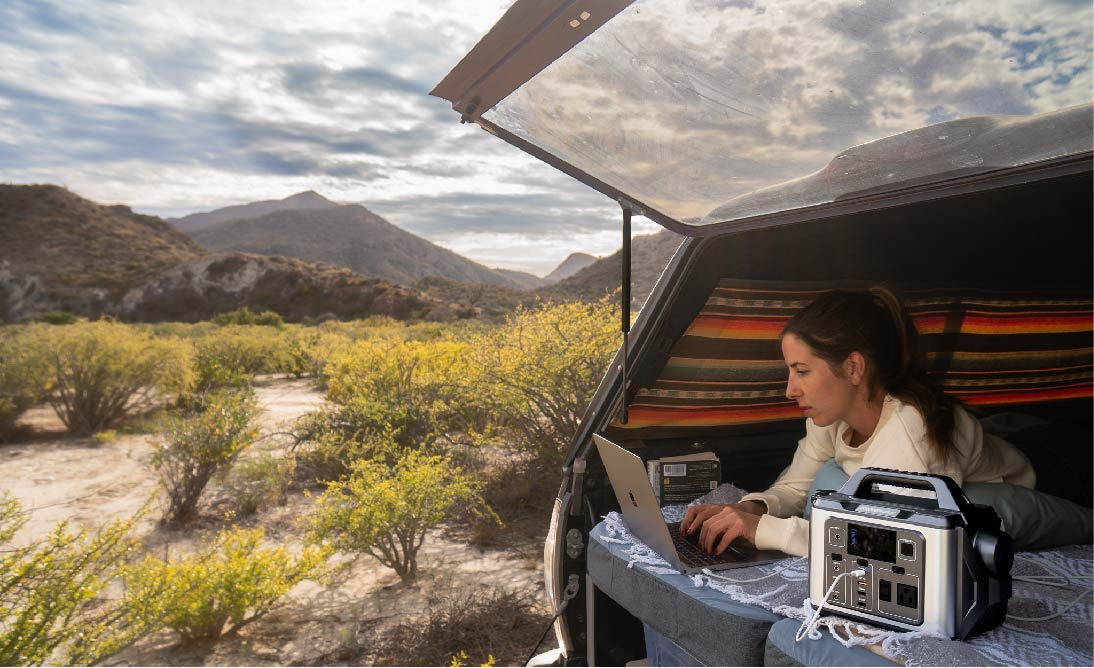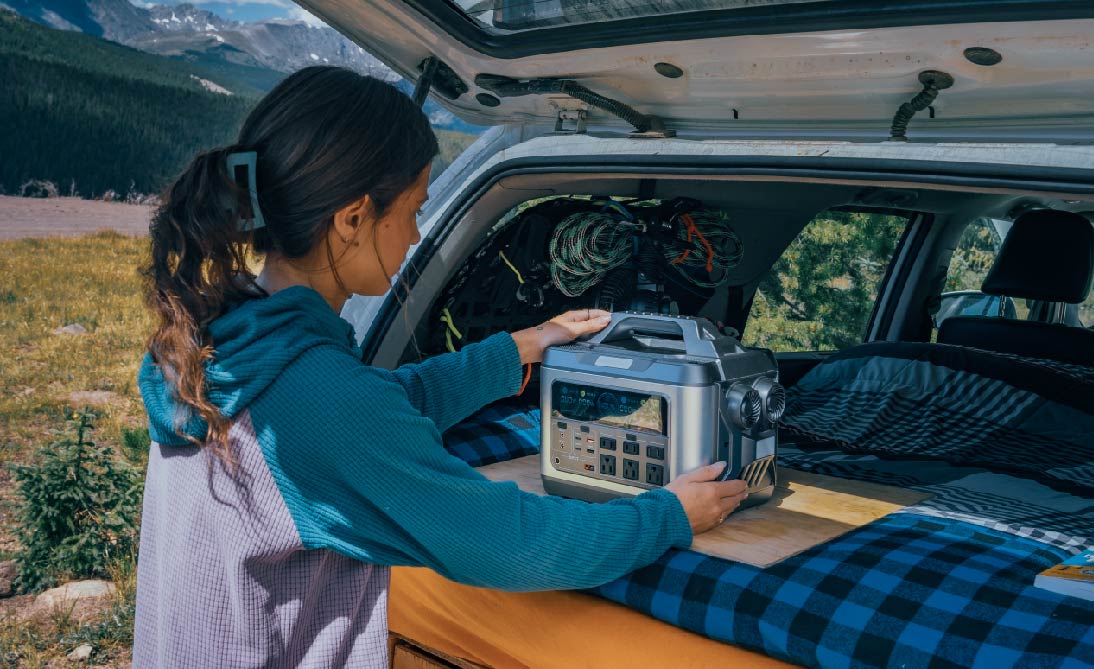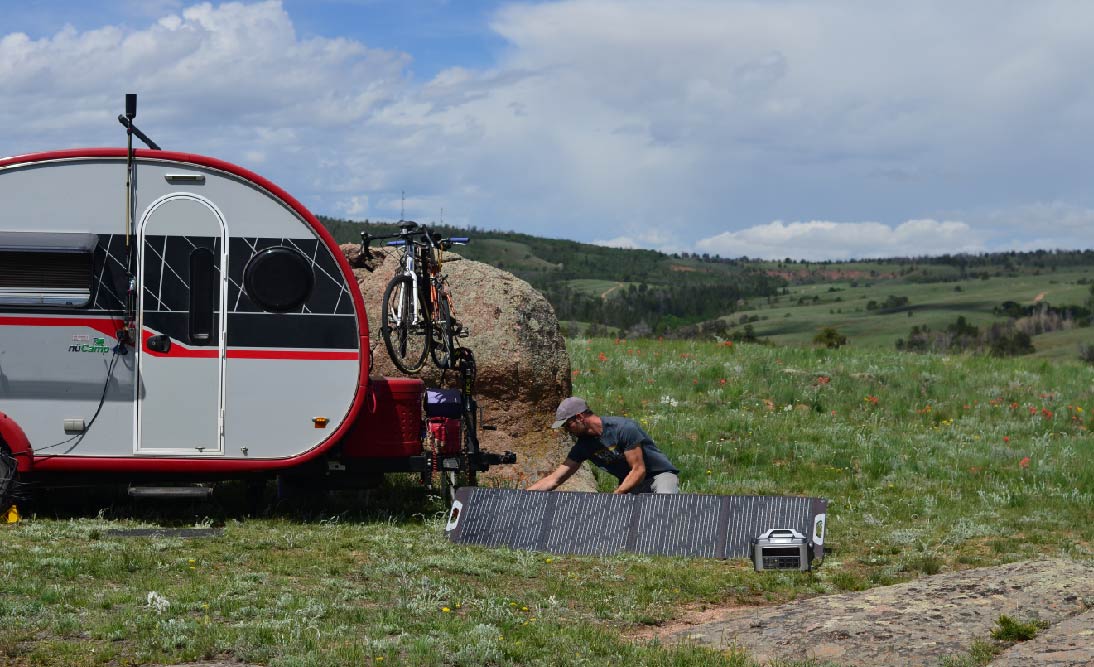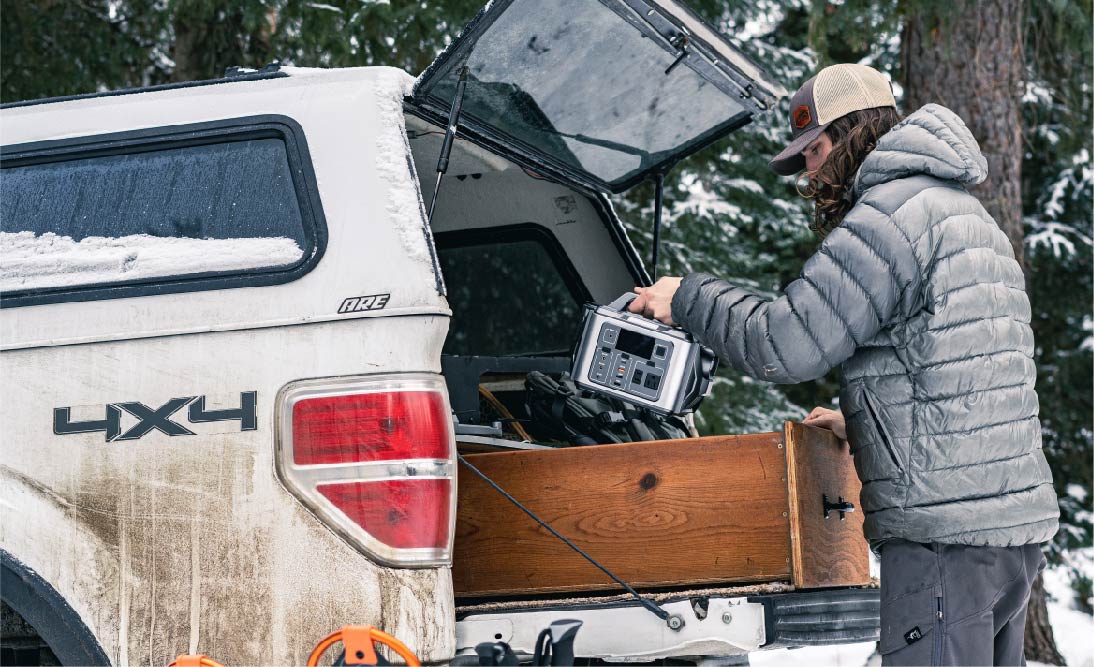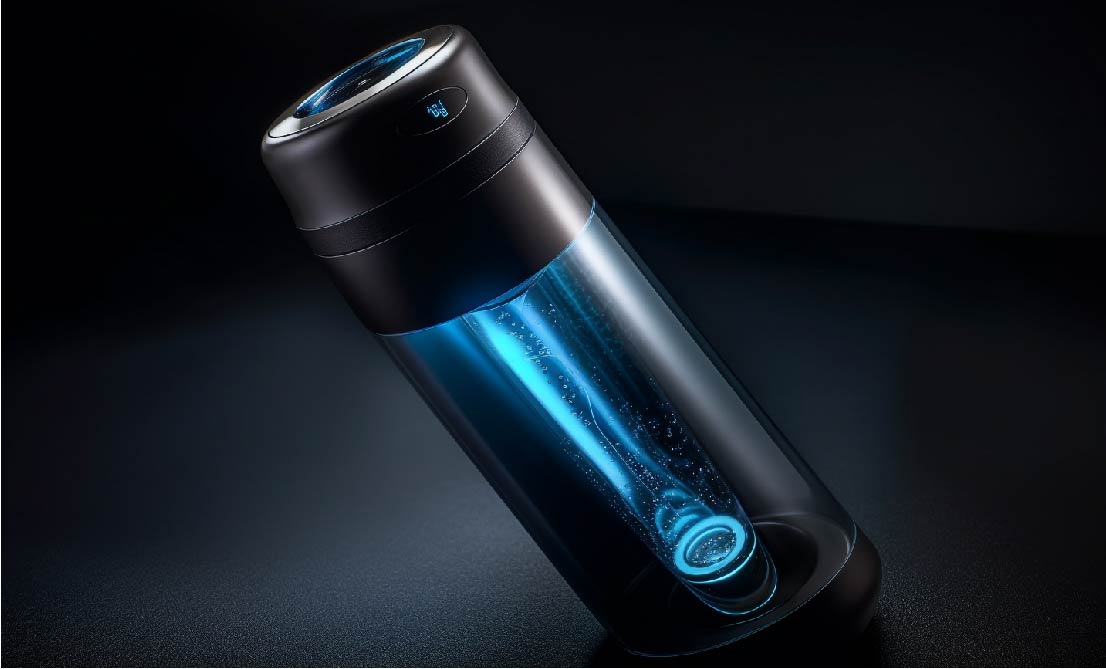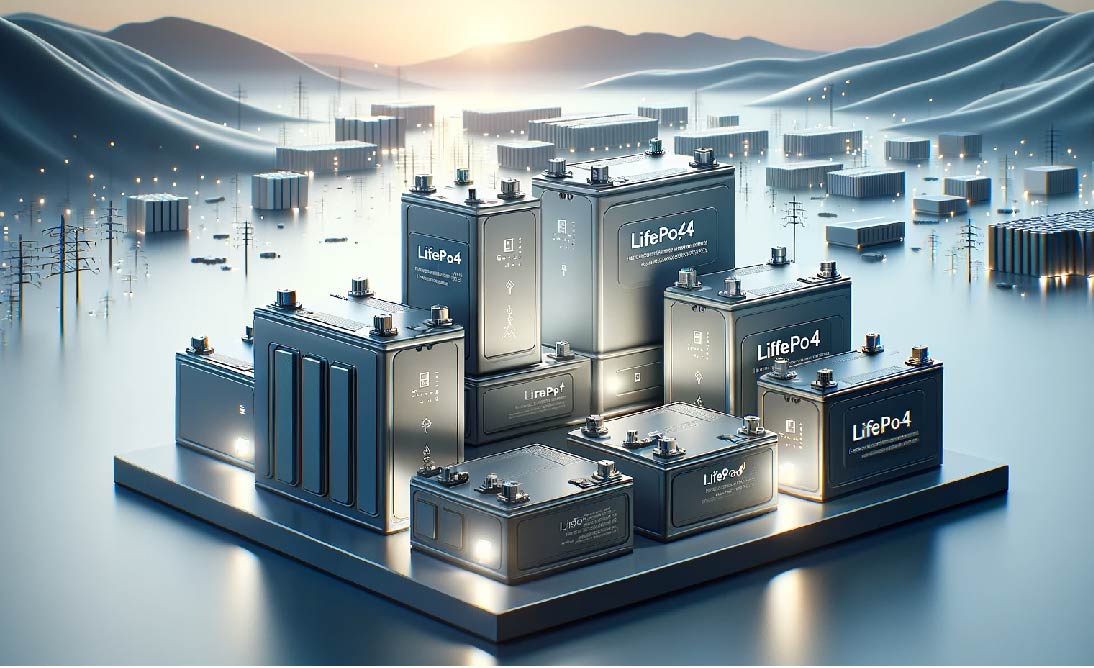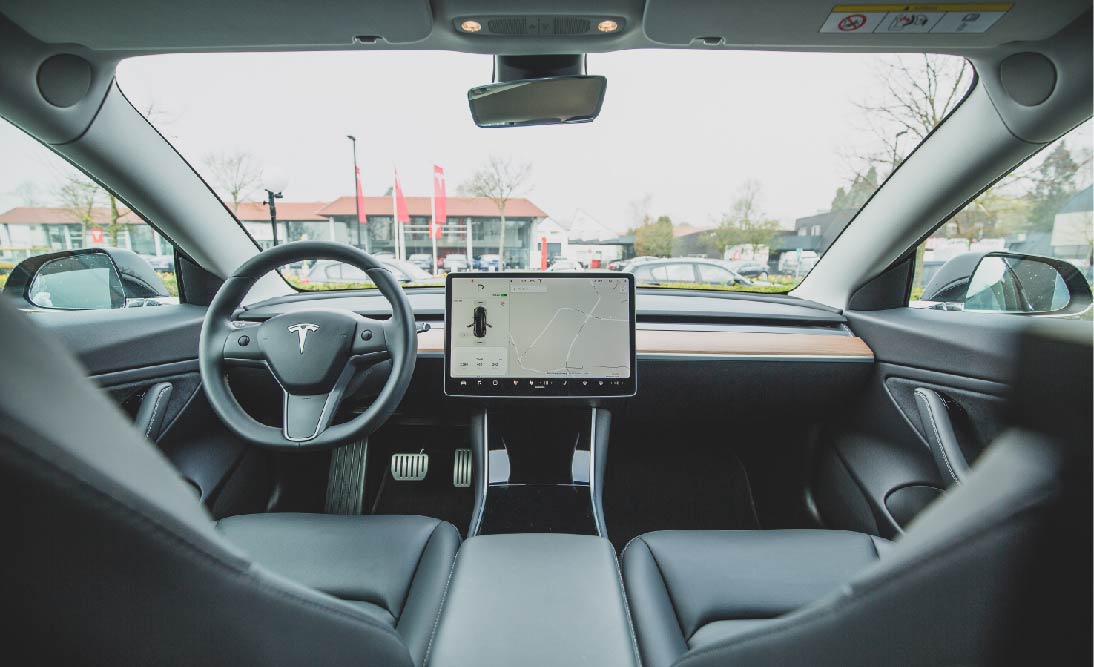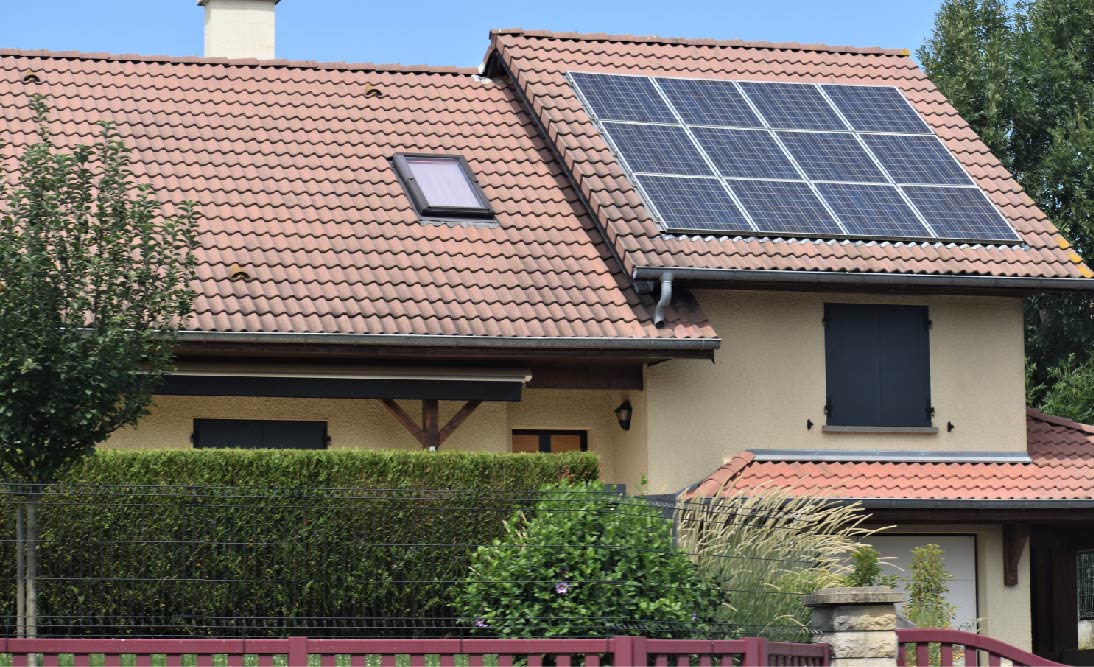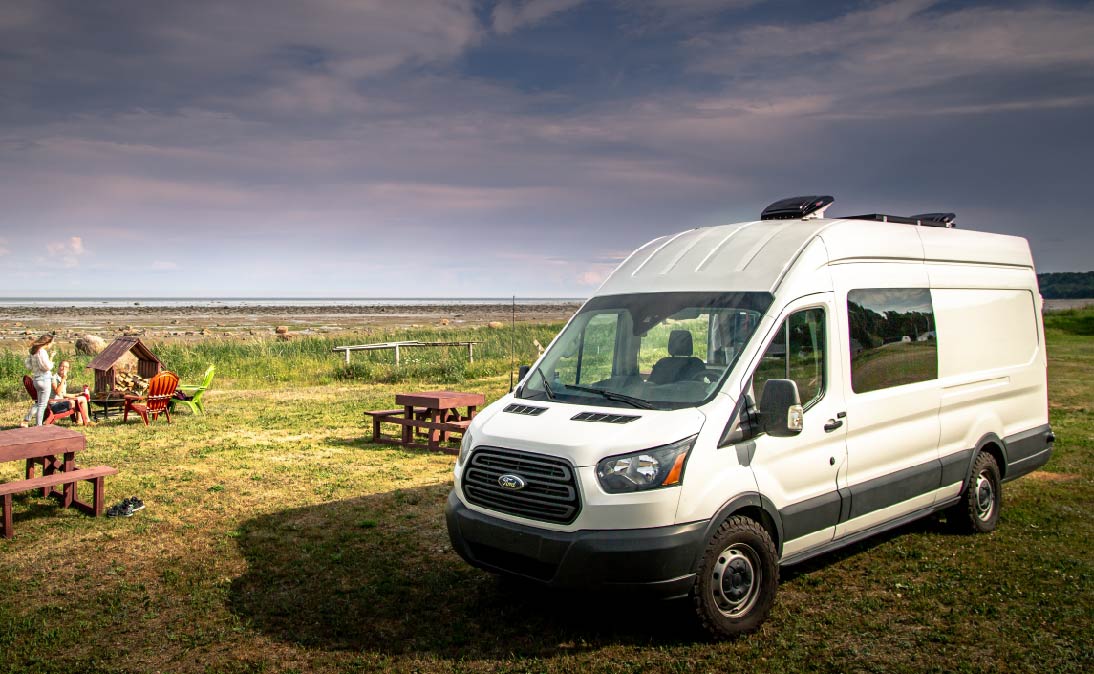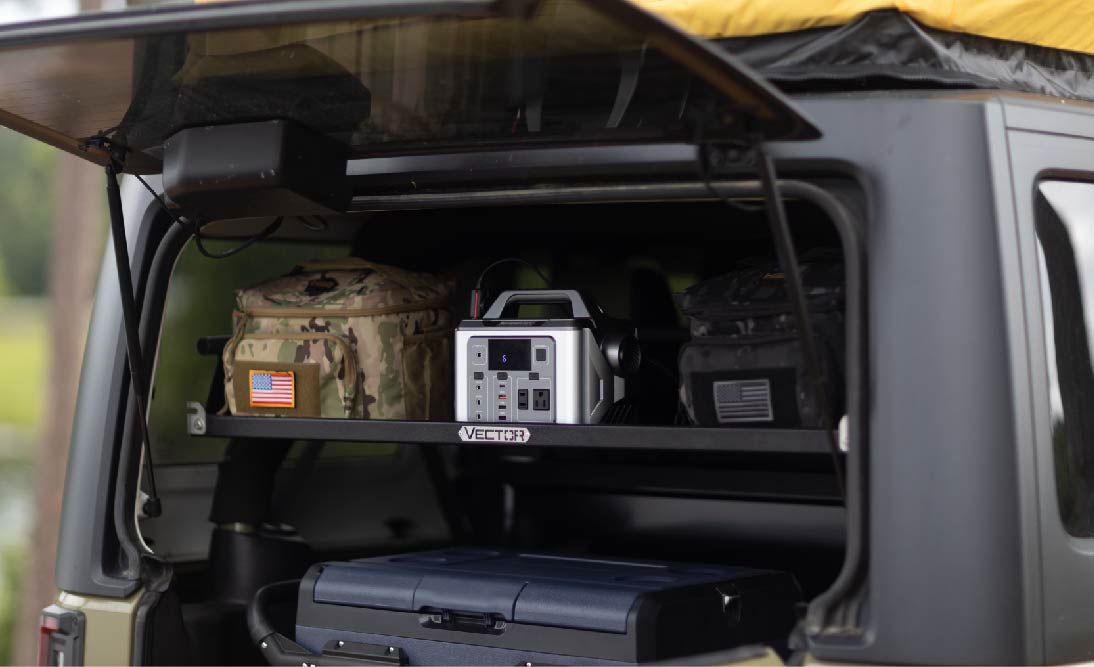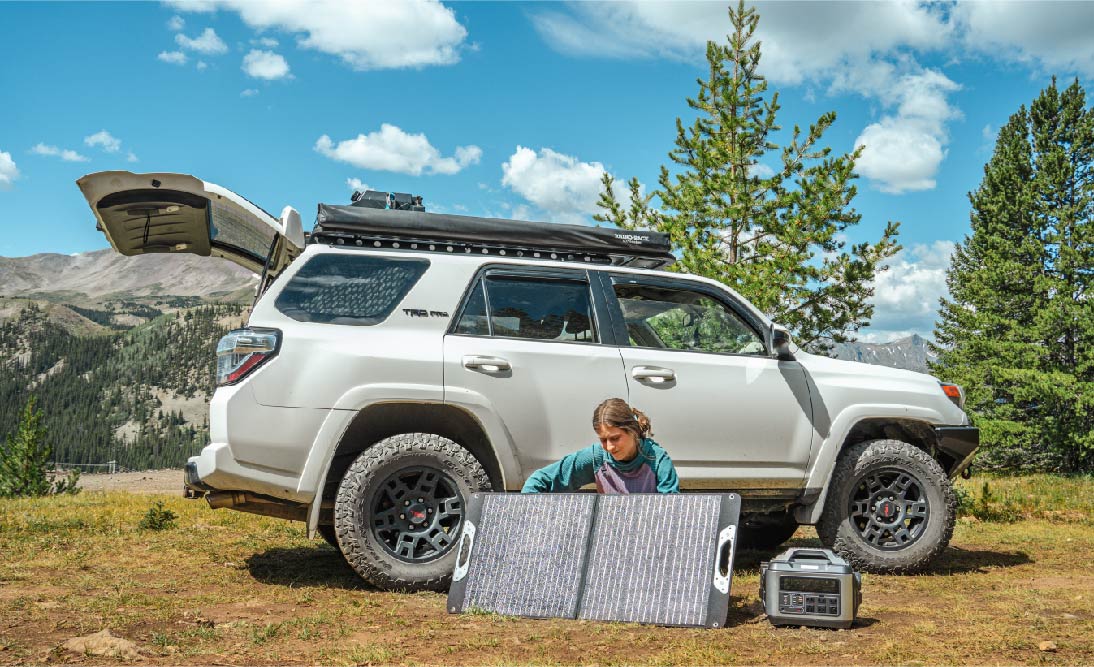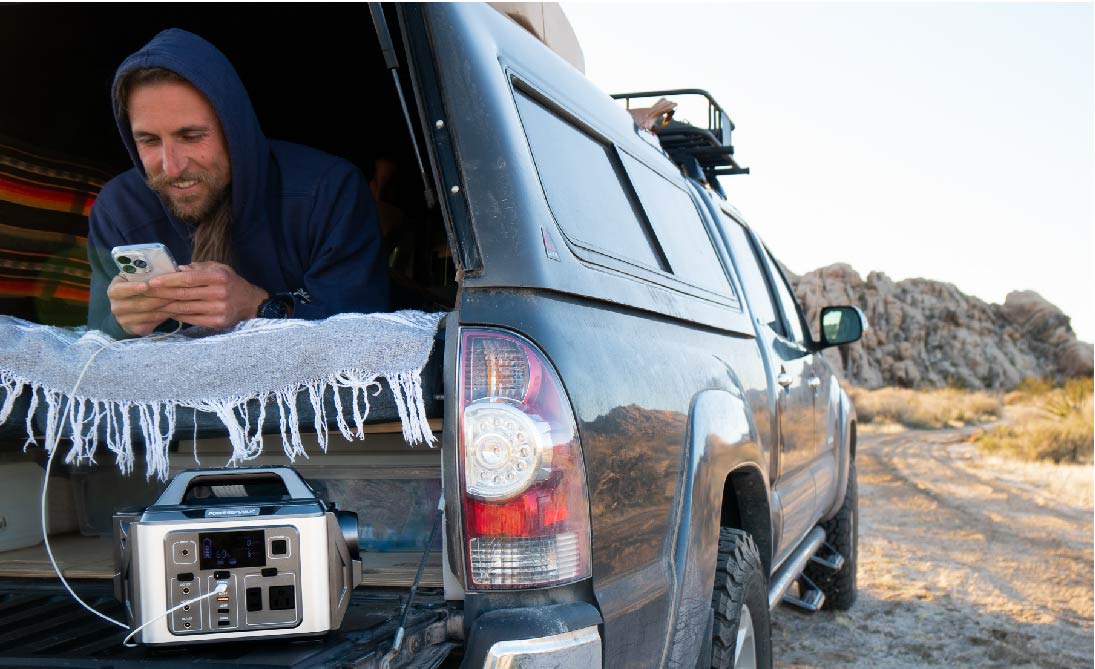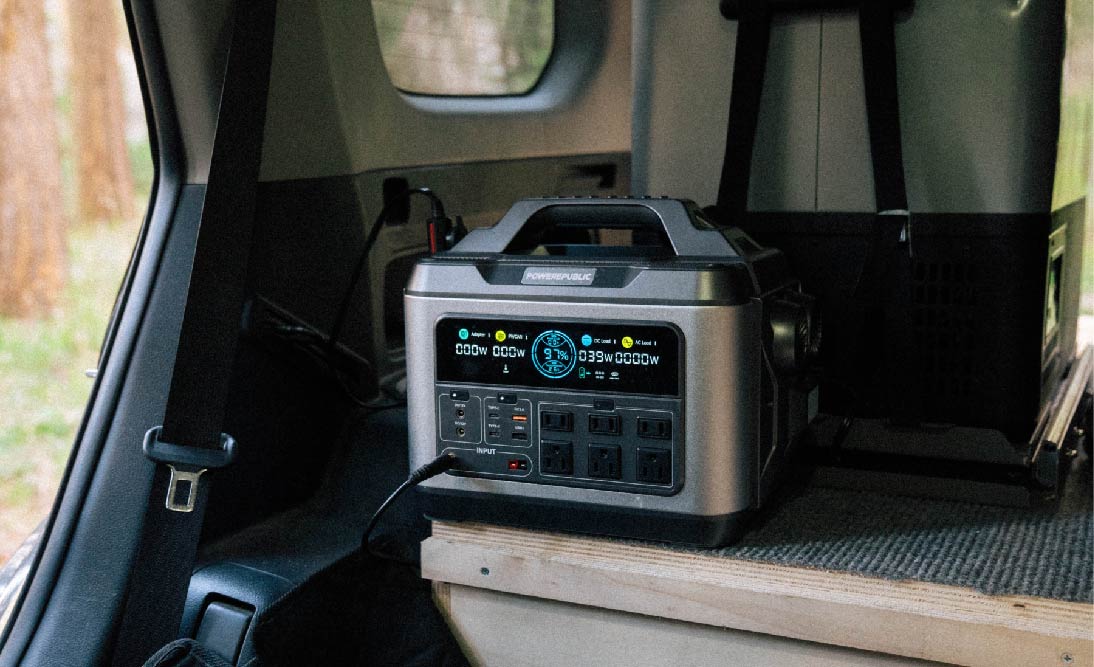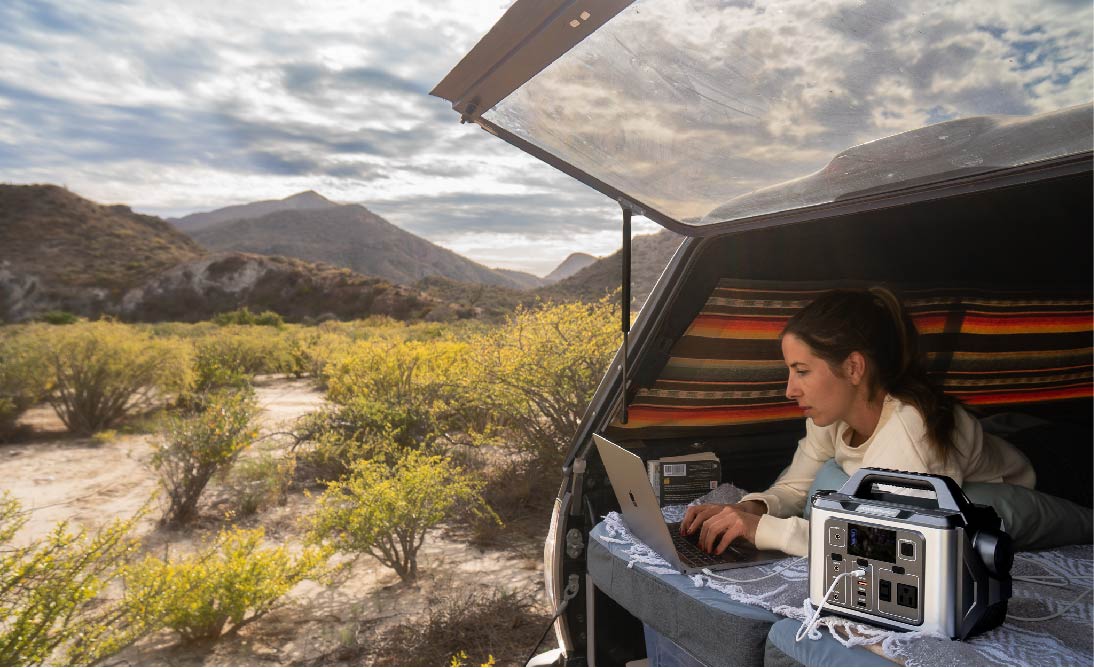Table of Contents:
Traveling with motorhomes, such as campervans and RVs, has become one of the most popular ways to explore the great outdoors and go wherever you want. Some people even choose to live in a van or an RV to avoid paying rent and other bills. However, living in an RV or a van is not as easy and fun as it sounds. A lot of preparation needs to be done before completely moving in, including considerations such as the size of the RV, security, parking, water heater, and most importantly, electricity.
Having sufficient power and electricity is crucial to ensure a worry-free travel experience. That's why RV solar generators have become highly sought after among van lifers and RVers. A reliable RV solar generator can serve as a backup when the primary battery level is low, keeping your devices and appliances charged, especially during cloudy and snowy days.
In this guide, we will discuss RV solar generators, their types, how to select the right one for your RV and introduce POWEREPUBLIC’s solar generator kits as one of the options for RV solar generators.
Let’s dive into it!
RV Solar Generator Overview

An RV solar generator is a system designed to harness solar energy and convert it into electrical power for use in recreational vehicles (RVs).
These generators typically consist of solar panels, a charge controller, a battery bank, an inverter, and sometimes a generator as a backup power source. The system allows RV owners to generate clean and sustainable power, reducing dependence on traditional fuel-powered generators and providing a quieter and more environmentally friendly energy solution.
Components of an RV Solar Generator:
-
Solar Panels: Photovoltaic panels capture sunlight and convert it into direct current (DC) electricity. The size of the solar array depends on the energy needs of the RV.
-
Charge Controller: This device regulates the charging of the battery bank by preventing overcharging and optimizing the efficiency of the solar panels.
-
Battery Bank: Deep-cycle batteries store excess energy generated by the solar panels for later use, such as at night or on cloudy days. Many RVers these days are using lithium-ion or LiFePO4 batteries.
-
Inverter: Converts DC electricity stored in the batteries into alternating current (AC), which is used to power standard household appliances and electronics in the RV.
-
Generator (Optional): Some RV solar generators come with a built-in generator to provide additional power when solar energy is insufficient.
How To Select an RV Solar Generator?

Selecting an RV solar generator involves careful consideration of your power needs, available space, budget, and the specific features of different systems. These factors will help you select a solar generator for your RV.
Here's a detailed guide on how to choose a solar generator for your RV:
1. Assess Your Power Needs
Determine Your Daily Energy Consumption:
-
Make a list of all the appliances and devices you plan to power using the solar generator. Note their power consumption in watts and estimate the daily usage in watt-hours (Wh).
-
LED lights: 20W x 4 hours = 80Wh
-
Refrigerator: 100W x 24 hours = 2400Wh
-
Laptop: 50W x 4 hours = 200Wh
-
Total Daily Consumption: 80Wh + 2400Wh + 200Wh = 2680Wh (2.68 kWh)
2. Consider Solar Panel Capacity
Determine Solar Panel Requirements:
-
On average, a 100W solar panel can generate about 400-600Wh per day, depending on sunlight conditions and panel efficiency.
-
For a daily consumption of 2.68 kWh, you might need approximately 5-7 solar panels of 100W each.
-
Roof space on your RV: Ensure you have enough space for the required number of solar panels.
-
Sunlight conditions: Consider the average sunlight hours in the locations you plan to travel.
3. Battery Capacity
Calculate Battery Capacity:
-
The battery capacity should be sufficient to store at least two to three days' worth of energy to account for cloudy days.
-
For a daily consumption of 2.68 kWh and a desired autonomy of 3 days, you might need a battery capacity of approximately 8 kWh (2.68 kWh/day x 3 days).
4. Inverter Capacity
Determine Inverter Size:
-
The inverter should have sufficient capacity to handle the peak power demand of your appliances.
-
If your highest power-consuming device is a 1500W microwave, consider an inverter with a continuous output of 2000W or more.
5. Consider Integrated Features
-
Ensure the solar generator comes with a charge controller to regulate the charging of the battery and prevent overcharging.
-
If you plan to move around frequently, opt for a portable system, such as portable solar generators, with lightweight components.
6. Budget
Consider Costs:
-
Compare the costs of different systems and factor in any additional expenses like installation or extra accessories.
7. Read Reviews
User Feedback:
-
Check reviews from RV owners who have used the solar generator to understand real-world performance and reliability.
-
One of the most famous review websites is Trustpilot. POWEREPUBLIC has a 4.5 out of 5 rating on Trustpilot.
9. Compatibility
Ensure Compatibility:
-
Confirm that the selected system is compatible with your RV's electrical system.
By carefully evaluating these factors, you can select the best solar generator for your RV that meets all your requirements during your trip.
Best RV Solar Generator

If you are searching for the best solar generator for an RV, consider the POWEREPUBLIC T2200 and T3000 solar generator kits. We recommend these two models because they not only power essential devices but also larger items and home appliances. A robust battery backup is crucial for RV living, and with our T2200 and T3000, you can set up your kitchen, theater, workplace, shower, and more—enabling you to do anything, anywhere you want.
For better understanding and comparison, we've created a table listing key features and specs of these two models, along with the working time for some commonly used RV devices and appliances in the wild.
|
Models |
Specs and Features |
RV Appliances(W) |
Duration(hours) |
|
2200W/2240Wh Peak 4500W LiFePO4 Batteries with 3000+ Cycyles 15 Different Output Ports Durable and Long-lasting |
Microwave Oven(700W to 1,500W) Refrigerator (100W to 200W) Air Conditioner (1,000W to 2,500W) Television(50W and 200W) Coffee Maker(600W to 1,200W) Toaster(800W to 1,500W) Hair Dryer(1,000W to 1,800W) Water Heater(1,000W to 1,500W) Electric Kettle(1,000W to 1,500W) Induction Cooktop(1,200W to 1,800W) |
Microwave Oven: 1 - 2.5 Refrigerator: 9.5 - 19 Air Conditioner: 0.5 - 2 Television: 9.5 - 38 Coffee Maker: 1.5 - 3 Toaster: 1 - 2 Hair Dryer: 1 - 2 Water Heater: 1 - 2 Electric Kettle: 1 - 2 Induction Cooktop: 1 - 1.5 |
|
|
3000W/3200Wh Peak 6000W LiFePO4 Batteries with 3000+ Cycyles 15 Different Output Ports Durable and Long-lasting |
Microwave Oven(700W to 1,500W) Refrigerator (100W to 200W) Air Conditioner (1,000W to 2,500W) Television(50W and 200W) Coffee Maker(600W to 1,200W) Toaster(800W to 1,500W) Hair Dryer(1,000W to 1,800W) Water Heater(1,000W to 1,500W) Electric Kettle(1,000W to 1,500W) Induction Cooktop(1,200W to 1,800W) |
Microwave Oven: 1.5 - 4 Refrigerator: 14 - 28 Air Conditioner: 1 - 2.5 Television: 13.5 - 54.5 Coffee Maker: 2 - 4.5 Toaster: 1.5 - 3.5 Hair Dryer: 1.5 - 2.5 Water Heater: 1.5 - 2.5 Electric Kettle: 1.5 - 2.5 Induction Cooktop: 1.5 - 2 |
Please note that:
-
All the provided working times are estimates, and actual durations may vary based on factors such as appliance models, brands, daily usage patterns, and other variables
-
The formula used to estimate the working time(hours): capacity of your solar generator(Wh)*0.85(conversion rate) / power of the appliances(W).
Benefits and Limitations of RV Solar Generator

Benefits of RV Solar Generators:
-
Clean and Sustainable Energy: Solar generators harness sunlight to generate electricity, providing a renewable and eco-friendly power source for your RV. If an RV solar generator produces 2,000Wh per day, and you use this energy to power lights and a laptop, you're avoiding the need to use a fuel-powered generator or draw power from the grid, reducing carbon emissions.
-
Reduced Dependency on Fuel: RV solar generators decrease reliance on traditional fuel-powered generators, reducing fuel costs and environmental impact. Consider the cost of running a fuel-powered generator for 8 hours a day at $3 per gallon. If the generator consumes 0.5 gallons per hour, the daily cost is 8 hours*0.5*3 = $12.
-
Quiet Operation: Solar generators operate silently, creating a quieter and more peaceful camping or living environment compared to traditional generators.
-
Cost Savings in the Long Run: While the initial investment may be higher, solar generators can lead to cost savings over time by reducing the need for fuel and maintenance.
-
Extended Battery Life: Solar generators often use advanced battery technologies, such as lithium-ion or LiFePO4 batteries, which offer longer lifespans and more charge-discharge cycles. Lithium-ion batteries commonly used in solar generators have longer lifespans, typically exceeding 2,000 charge-discharge cycles, compared to traditional lead-acid batteries.
-
Low Maintenance Requirements: Solar generators have fewer moving parts, resulting in lower maintenance requirements compared to traditional generators.
-
Off-Grid Capability: RV solar generators allow for off-grid living or camping, providing power even in remote locations without access to electrical hookups.
Limitations of RV Solar Generators:
-
Initial Cost: The upfront cost of purchasing and installing a solar generator system can be relatively high, including the cost of solar panels, batteries, and other components. Portable solar generator kits range from $200 to $3000 whereas some RV solar generator systems may cost more than $3000.
-
Weather Dependency: Solar power generation is weather-dependent, and cloudy or rainy days can reduce the efficiency of solar panels, affecting the available power.
-
Limited Power During Night: Without additional energy sources or a sufficient battery capacity, RV solar generators may have limited power availability during nighttime hours.
-
Space Constraints: Limited roof space on an RV may restrict the number of solar panels that can be installed, affecting the overall power generation capacity.
-
Weight Considerations: Adding solar panels, batteries, and other components can increase the overall weight of the RV, impacting fuel efficiency and potentially requiring structural modifications. Even portable solar generator kits with high power output and battery capacity can be quite heavy.
-
Energy Storage Limits: The battery capacity determines how much energy can be stored. Insufficient battery capacity may lead to power shortages during periods of high demand. POWEREPUBLIC T2200 and T3000 solar generator kits can store 2240Wh and 3200Wh energy separately.
-
Variable Efficiency: Solar panel efficiency varies based on factors such as tilt, orientation, and shading. Optimizing these factors is crucial for maximizing power generation.
FAQ I: How Long Does a Portable Power Station Last?

The lifespan of a portable power station depends on various factors, primarily the type of battery it uses. Most portable power stations utilize lithium-ion or lithium-iron phosphate (LiFePO4) batteries. These batteries typically last for 500 to 2,000 charge-discharge cycles.
Lithium-ion Batteries (Li-ion): These batteries usually last between 500 to 1,000 cycles. If you use the portable power station daily and fully deplete and recharge it, you can expect around 2 to 5 years of lifespan.
Lithium Iron Phosphate Batteries (LiFePO4): LiFePO4 batteries offer a longer lifespan, ranging from 1,000 to 2,000 cycles. With regular use, they can last approximately 5 to 10 years.
Factors affecting the lifespan include usage patterns, temperature, and maintenance. To maximize the life of your portable power station, avoid deep discharges, store it in a cool environment, and follow the manufacturer's maintenance guidelines.
FAQ II: How Long Does a Solar Panel Last?

Solar panels have a longer lifespan compared to batteries and typically last between 25 to 30 years or more. The longevity of solar panels is influenced by several factors:
-
Material Quality: High-quality materials contribute to longer lifespans. Most modern solar panels use durable materials such as monocrystalline or polycrystalline silicon.
-
Manufacturing Standards: Panels manufactured to high standards are likely to withstand environmental conditions better.
-
Installation and Maintenance: Proper installation and regular maintenance, such as cleaning, contribute to a longer life.
-
Climate: Solar panels in moderate climates generally experience less wear and tear than those in harsh environments.
While solar panels may still produce electricity beyond their rated lifespan, their efficiency tends to decline gradually. Regularly monitoring their performance and addressing issues promptly can help maintain optimal efficiency.
FAQ III: How To Select an Inverter for My RV?

Selecting the right inverter for your RV involves considering your power needs and the types of devices you plan to run. Follow these steps:
-
Determine Power Requirements: Make a list of all appliances and devices along with their power consumption in watts. Identify the device with the highest starting (surge) and running power requirements.
-
Inverter Capacity: Choose an inverter with a capacity higher than your highest power-consuming device. If your device requires 1,500W, opt for an inverter with a continuous output of 2,000W or more.
-
Waveform Type: Consider the waveform type. Pure sine wave inverters provide clean power and are suitable for sensitive electronics, while modified sine wave inverters are more cost-effective but may not be suitable for all devices.
-
Installation: Determine where you will install the inverter. Some are designed for permanent installation, while others are portable. Ensure the inverter is compatible with your RV's electrical system.
-
Additional Features: Consider features like multiple outlets, USB ports, and remote control options based on your convenience and usage requirements.
FAQ IV: How To Determine the Battery Capacity for My RV?

To determine the battery capacity for your RV, follow these steps:
-
Calculate Daily Energy Consumption: List all appliances and devices you plan to power. Note their power consumption in watts and estimate daily usage in watt-hours (Wh).
-
Consider Autonomy Period: Determine the number of days you want your battery to sustain power during cloudy or non-charging days (autonomy period). A common range is 2 to 3 days.
-
Calculate Required Capacity: Multiply daily energy consumption (Step 1) by the chosen autonomy period (Step 2). This gives the required battery capacity in watt-hours.
-
Select Battery Type: Choose a battery type based on your needs. Lithium-ion batteries are popular for their high energy density and longer lifespan.
-
Adjust for Efficiency: Apply an efficiency factor, typically around 85%, to account for energy losses during charging and discharging.
-
Example: If your daily consumption is 2,000Wh, and you want a 3-day autonomy, the required battery capacity would be 2,000 Wh/day*3 days=6,000 Wh. Adjusting for efficiency, you might need a battery with a capacity of 6,000/0.85=7,058Wh.
FAQ V: How To the Sizes of Solar Panels for My RV?

To determine the size of solar panels for your RV, follow these steps:
-
Calculate Daily Energy Needs: Use the daily energy consumption calculated in FAQ IV to determine the amount of energy your solar panels need to generate.
-
Consider Sunlight Hours: Determine the average sunlight hours per day in the locations you plan to travel. Multiply the daily energy needs by the inverse of this value.
-
Calculate Panel Size: Divide the result from Step 2 by the efficiency of the solar panels. This gives you the required solar panel capacity in watts.
-
Example: If your daily energy needs are 2,000Wh and you have an average of 5 sunlight hours per day, the required solar panel capacity would be 2,000 Wh/5 hours = 400W. Adjusting for an efficiency factor (e.g., 0.85), you might need a solar panel with a capacity of 400W/0.85=470W. Round up, you will at least need a 500W solar panel.
Final Thoughts
In conclusion, RV solar generators offer a transformative solution for those seeking sustainable, cost-effective, and off-grid power options. With components like solar panels, advanced batteries, and inverters, these systems harness clean energy, reducing environmental impact and fuel dependency.
While the initial investment may be higher, the long-term benefits, including cost savings, extended battery life, and low maintenance, make RV solar generators a prudent choice. Notably, the POWEREPUBLIC T2200 and T3000 emerge as the 2 best solar generators for RV, embodying efficiency and versatility for diverse RV power needs. Despite limitations such as weather dependency and space constraints, the advantages of quieter operation, reduced fuel reliance, and off-grid capability position these solar generators as the best for RV enthusiasts, providing an eco-friendly and reliable power solution for their mobile lifestyles. By carefully evaluating your power needs, you will have a better understanding of how to select a solar generator for an RV.
